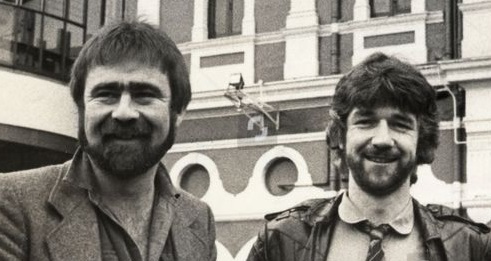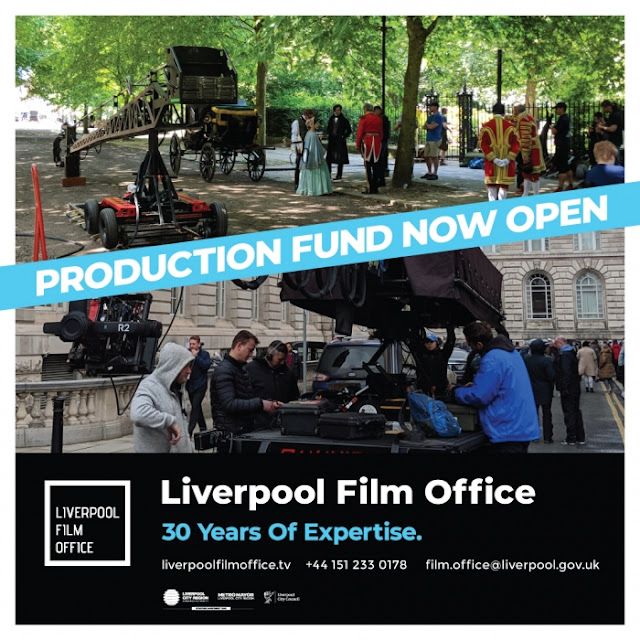The aim of the City Film blogs, of which this is a part, is to highlight films and tv movies that show off the locations, stories, actors, and filmmakers of British cities. The films must be at least an hour, made from the late 1950s onwards, and portray the city in that same timeframe or very close to it.
The focus here is the five metropolitan district councils of Merseyside (Liverpool, Sefton, Wirral, Knowsley, and St Helens). Since these have had so many films, the blog is in three parts - corresponding to the time periods in which the films were released.
OK, some films …
Dangerous Youth
(1957),
about a teenage Liverpudlian singer getting drafted into National Service,
starred Frankie Vaughan who was born in Liverpool in 1928 and raised there
until being evacuated during the Second World War. Apart from a young Kenneth
Cope the rest of the main cast was not from the area. The barracks in the film were
in London and locations in that city stand in for Liverpool several times but
the film nonetheless has lots of shots of locations including the Pier
Head, Dingle riverside, St. George’s Hall, and the Lime Street area.
Violent Playground (1958) is based on Liverpool Police Department’s employment, in 1949, of a small number of officers dedicated to deal with youth crimes. The film's set dressers reportedly annoyed residents by making the main shooting location (the now-demolished Gerard Gardens) more dilapidated than it was. Despite innovatively (for the time) showing several mixed-race and black characters, and having two important British-Chinese characters, only Fred Fowell (before he took the stage name Freddie Starr) has a local accent. The Queensway Mersey Tunnel is the endpoint for the car chase scene.
 |
| Genuine/believable local accents are important to City Films. In Violent Playground only Fred Fowell, before he became Freddie Starr, has a local accent. |
Beyond This Place (1959) is about a man who returns, from America to his birthplace city of Liverpool to discover that the father he thought was dead is in prison for murder (for a crime he maybe didn’t commit). The Pierhead, city centre, St John's Gardens, and the museum and library buildings on William Brown Street all feature.
Ferry Cross the
Mersey (1965)
features Liverpool band Gerry and the Pacemakers and their attempt to win a fictional
talent contest in the city’s 1960's Beat Scene. Marsden wrote nine new songs
for the film whilst performances from local artist Cilla Black and several local
bands also feature. The idea for the film came from the band’s manager,
Liverpudlian Brian Epstein. City locations included the Mountwood ferry on the
River Mersey, the Albert Dock, The Cavern Club, Frank Hessy's music store, and
the Locarno Ballroom. Most of the non-musician actors have no local connections
although Liverpool-born and raised Deryck Guyler has a good part.
 |
| Some City Films will capture a cultural scene in a city's history. Ferry Cross The Mersey helped to do this for The Merseybeat Scene. |
The Golden Vision (1968) is a 75-minute BBC ‘Wednesday Play’ that combines behind-the-scenes documentary coverage of Everton FC with comedy-drama of fictional supporters’ lives. The title of the film was the nickname of Everton’s then centre-forward Alex Young. The screenplay is partly drawn from the experiences of its writer Liverpool-born Neville Smith who also had a part in the film. Liverpudlian actors Ken Jones and Johnny Gee had leading roles as did local stand-up comedians Joey Kaye and Bill Dean (Dean was born as Patrick Connolly in Everton and took his stage name in honour of Everton football legend William 'Dixie' Dean).
The Big Flame (1969) is a BBC Wednesday Play about striking Liverpool dockworkers rejecting management demands of a return to work and deciding instead to occupy the docks and run things themselves (a so-called "work-in"). Some of the key roles are played by Liverpudlians – notably Norman Rossington and ex-docker Peter Kerrigan. Real dockers also appear as extras. The film title was soon after used by a socialist organisation founded in Liverpool in 1970.
What’s Good for
the Goose (1969)
is about the amorous escapades of a 50-something assistant bank manager (Norman
Wisdom) who attends a conference in Southport. The film uses locations in and
around the town, including Scarisbrick Avenue, the beach, Wayfarer’s Arcade,
pier, funfair, Floral Hall Gardens, Rotten Row, and the Birkdale Palace Hotel.
The Reckoning
(1970)
is a tale of a successful businessman in London, who returns to his hometown
Liverpool when his father has been attacked for singing Irish rebel songs. The son
takes revenge. Most non-London scenes were filmed in Wallasey and Birkenhead including
one of the bridges that connect the two. Everton’s St George's church
and surrounds also get a look-in. The screenplay is by John McGrath who was
born in Birkenhead
to Irish Catholic parents and who, despite leaving at age 4 on the outbreak of
World War Two, would later be heavily involved in the early 1960s creation of Merseyside-set
TV series Z-Cars and, between 1970 and 1972, worked at the Liverpool Everyman
Theatre, developing community-style theatre for working-class audiences.
 |
| The Reckoning's lead character, played by Nicol Williamson, crosses one of the bridges connecting Birkenhead and Wallasey. |
 |
| John McGrath - screenplay writer of The Reckoning - had various Merseyside connections. |
Gumshoe (1971), about an amateur private detective in Liverpool, was written by Neville Smith, who makes a cameo appearance. The film features various city locations including several buildings that have long since been demolished. The Broadway Club that features in the film was (and still is) a real venue in Norris Green. The Club's (then) owner, Ernie Mack (Ernie McGrae), appears briefly with his jazz group the Saturated Seven (the father of the former Everton FC player and manager Joe Royle was the band’s pianist). Bill Dean plays the club manager and Ken Jones also has a part.
 |
| One element of a City Film is that it is written by local writers - such as Neville Smith. |
The Rank and File (1971) is a fictionalised BBC tv film of the Pilkingtons Glass strike in St Helens in 1970 and the lead actors are from Liverpool and Lancashire. Writer Jim Allan had met with the strikers at the time and based the character, Charlie, on one of them. The BBC, concerned about legal issues, insisted that the company name be changed to Wilkinsons (clever huh) and the setting (and shooting location) to the West Midlands. Nonetheless, the film starts by saying that it is “based principally on events that took place in Lancashire in the Spring of 1970". Not a city film but an important part of St Helens story and so worthy of mention.
After a Lifetime
(1971),
a tv film written by Neville Smith focuses upon two adult sons reflecting on
the life of their recently deceased trade unionist father. Smith drew on his experience
of losing his father (photos of whom can be seen in the opening credits) for
inspiration and played the eldest son. Their uncle, played by Peter Kerrigan, tells them about their father’s impressive activist past. Bill Dean plays
another uncle. Jimmy Coleman, Johnny Gee, Joey Kay, Mike Hayden, and Ernie Mack also feature. The film reportedly influenced writer Alan Bleasdale to end his classic Liverpool-set early-80s tv series The Boys from the Blackstuff with the funeral of another working-class Liverpool activist, played by Peter Kerrigan. As with After a Lifetime, Mike Hayden plays the priest conducting the funeral.
Lucky (1974) is a tv film about Samuel 'lucky' Ubooto, a twenty-something man of Irish and African parentage who has just been released from prison (could he not have come back from the navy, University, etc.?). The film focuses on Lucky on that first day as he wanders around Liverpool. Paul Barber, Toxteth-born to a white mother and Sierra Leonean father plays the lead role. The other local actors in lead roles are Doreen Sloane and Peter Kerrigan.
 |
| City Films need to reflect a place's racial and ethnic diversity. Actor Paul Barber seems to have been the first non-white lead in a Liverpool city film. |
Death of a Young, Young Man (1975), is a BBC tv film about three lads from a high-rise Liverpool council estate who go potato picking a few miles away in rural Lancashire. Written by Knowsley's Willy Russell and featuring local lad Gary Brown as Billy and a 15-year-old Andrew ‘Drew’ Schofield (Cazza), it was filmed around Kirkby (Knowsley). Paul Cahill (Bo) may well also have been local too, but I can’t find anything about him.
 |
| The 1970s saw locally-set tv films from both Alan Bleasdale (left) and Willy Russell (right). |
Bag of Yeast (1976) is a 60-minute tv film about how a man’s decision to be ordained as a Catholic priest impacts his family and friends. It was written by and stars Neville Smith with Peter Kerrigan playing his father and Alison Steadman (who spent her first 20 years in Liverpool) his fiancée. The wider cast included a range of well-known locals – Gladys Ambrose, Bill Dean, Jimmy Coleman, Mike Hayden, and Ernie Mack. The title is, apparently, rhyming slang (not something Merseyside is known for!) for priest.
Scully's New Year's Eve (1978) was the tv film debut of a pre-existing character, Francis "Franny" Scully. Writer Alan Bleasdale first brought him to life to entertain his pupils when he was a teacher in Huyton. The character then made it to several BBC Radio Merseyside and Radio City plays in the 1970s, a stage play, and two novels – a full tv series would follow in 1984. Scully is played by Andrew Schofield whilst the other character, "Mooey" Morgan, was played by Ray Kingsley. Bleasdale claimed that Kingsley, who died young, was the inspiration for Mooey. Other Liverpool talent includes Gil Brailey, Jimmy Coleman, Arthur Kelly (once in a band with George Harrison), comedian Mick Miller (playing a wannabe stand-up), and Roger Philips (later a distinguished Merseyside broadcaster).
 |
| Before the '80s Scully tv series, Andrew 'Drew' Schofield (right) and Ray Kingsley first appeared in a late '70s tv film featuring their respective characters Scully and Mooey. |
 |
| Some of the key Liverpool actress to feature in city films in the 1970s |
The Birth of the Beatles (1979) covers the period from the early 60s in Liverpool through the time in Hamburg and finishing in 1964 with the band heading to New York for their appearance on the Ed Sullivan Show. The former drummer Pete Best served as a consultant and some have alleged that the film consequently misrepresents the reasons for his dismissal from the band. In addition to the story, there are shots of the city – including Pier Head, Anglican Cathedral, St. James Gardens, Brunswick Dock, Litherland Town Hall, Penny Lane, and Strawberry Field.
 |
| The first of several films that attempt to capture The Beatles' early days in Liverpool. |
To go to part 2 (the 80s and 90s) please click here.
























